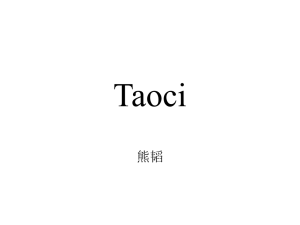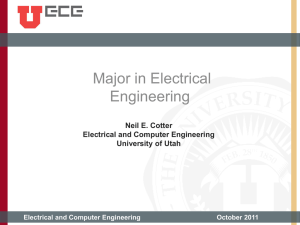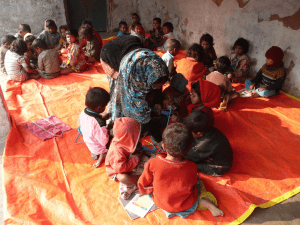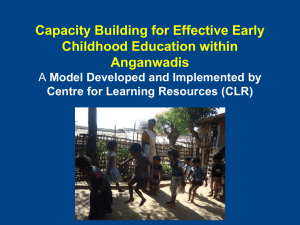Vocational Outcomes
advertisement
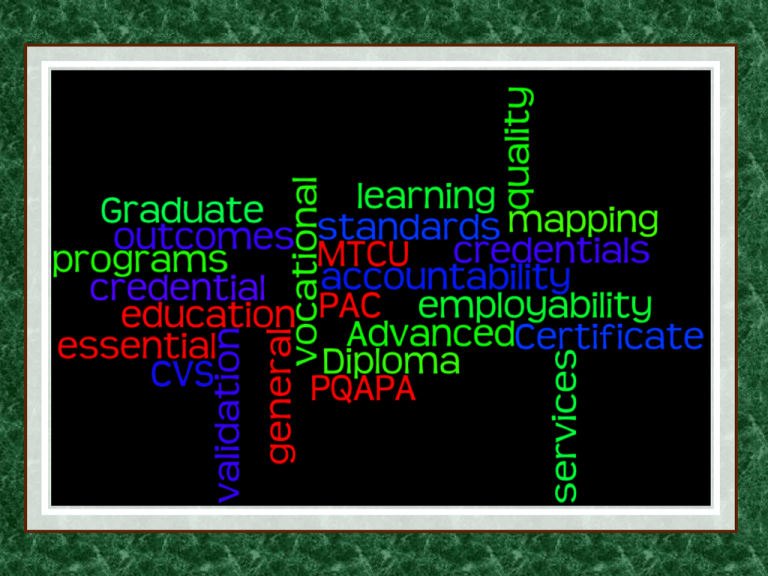
Outcome Based Education and Program Standards ……Just the facts Roberta Burke, Mohawk Kathy Bouma, Fanshawe Objectives: • Recognize critical factors which influence and shape programs and courses at Ontario community colleges • Identify terms and concepts commonly encountered: CVS, PQAPA, EES, MTCU, OBE, PAC, Gen. Ed. • Describe relationship between program standards and courses in an outcomes-based education environment How many of you have been…. 1. Given a course outline and asked to follow an existing course(s) ? 2. Asked to develop a “new” course or program? 3. Involved in program mapping, program review or participated in a quality audit at your college? Working Together: Who does what, when? Ministry of Training, Colleges and Universities (MTCU) Credentials Validation Service (CVS) College • Establishment of Provincial Program Standards • Funding of programs when requested on basis of: - Fit with government priorities - Public policy issues - Entry to practice issues • Validation of proposed credential against requirements of Framework • Assurance that program titling conforms to titling protocols • PQAPA • Program design, delivery and approval • Development and articulation of courselevel learning outcomes • Creation of curriculum to assure learning • Approval of program by Board of Governors Ministry of Training, Colleges and Universities (MTCU) Framework for Programs of Instruction (Minister’s Binding Policy Directive) • This Policy says that: “a college is to award credentials at the successful completion of programs of instruction consistent with the Credentials Framework” 7 Credentials Validation Service (CVS) Mandate (under ‘College Charter” legislation): • To provide reasonable assurance that all postsecondary programs of instruction, regardless of funding source, conform to the Credentials Framework and system-wide titling principles • Maintain the integrity of credentials provincewide Considerations re Credentials • Typical Duration of a Program • Admissions Requirements • Names of Credentials • Scope of Curriculum Outcomes • Adherence to Vocational Outcomes 9 College Programs in Ontario Standard components….. Vocational Outcomes Essential Employability Skills General Education Outcomes http://www.edu.gov.on.ca/eng/general/college/progstan/intro.html Vocational Outcomes • Terminal, complex role performances a graduate is required to demonstrate for the successful attainment of an entry-level position in the field of choice (employment focused, determined with input from Program Advisory Committees – PAC’s ) • Higher level outcomes – the final ‘product’ • Focus is on what the student/graduate can do at the end of the program General Education (Gen. Ed.) • Contribute to the development of citizens who are conscious of the diversity, complexity and richness of the human experience • Discretely designed courses in subjects such as Arts in Society, Civic Life, Social and Cultural Understanding, Personal Understanding, and Science and Technology 13 Essential Employability Skills (EES) • Regardless of the program, these are skills that are critical for success in the workplace, in day-to-day living, and for lifelong learning. • Categories are: Communication Numeracy Critical Thinking & Problem Solving Information Management Interpersonal Personal 14 Program Map - Course Relationship Program Outcomes Curriculum to achieve outcomes list of courses Program-level outcomes: (a) Meet or exceed standard components: - Vocational Outcomes - General Education Outcomes - Essential Employability Skills Course distribution across the program allowing for “reliable” demonstration of outcome achievement A sample ‘program map’ follows for the ECE program….. ECE Program Map Vocational Outcomes (9) 1. Plan curriculum that is based on a thorough understanding of child development 2. Plan and implement individual programs and curriculum to meet the development needs of children 3. Utilize a variety of observation techniques to enhance work with children, families, and co-workers 4. Maintain responsive relationships with individual children and groups of children 5. Establish and maintain safe and healthy environments which best meet the requirements of current legislation, regulatory bodies, and program policies 6. Develop and maintain effective written, oral, nonverbal, and electronic communications with children, families, co-workers, employers, and individuals/agencies 7. Apply relevant legislation, policies, procedures, and regulations to early childhood education programs and settings in a changing social context 8. Apply a personal philosophy of early childhood education within the framework of ethical and professional standards 9. Act in a manner consistent with principles of fairness, equity, and diversity to support the development and learning of individual children, within the context of his/her family, culture, and society. ECE Program Map Vocational Outcomes ECE Program Map Gen. Ed. requirement 5 courses throughout the program -- Cover a breadth of goals Courses should meet the following objectives: Understand beauty, form, taste, and the role of arts in society Understand the meaning of freedoms, rights, and participation in community and public life Understand the cultural, social, ethnic, and linguistic diversity of Canada and the world Gain greater self-awareness, intellectual growth, well-being, and understanding of others Understand relationships among individuals and society Appreciate the contribution of science to the development of civilization, human understanding, and potential Understand the interrelationship between the development and use of technology and society and the ecosystem Understand the meaning, history, and organization of work; and working life challenges to the individual and society ECE Program Map Vocational Outcomes General Education Requirements Essential Employability Skills (11) ECE Program Map Not individual courses throughout the program Skills that are woven throughout the program 1. 2. 3. 4. 5. 6. 7. 8. 9. 10. 11. Communicate clearly, concisely and correctly in the written, spoken, and visual form that fulfills the purpose and meets the needs of the audience Respond to written, spoken, or visual messages in a manner that ensures effective communication Execute mathematical operations accurately Apply a systematic approach to solve problems Use a variety of thinking skills to anticipate and solve problems Locate, select, organize, and document information using appropriate technology and information systems Analyze, evaluate, and apply relevant information from a variety of sources Show respect for the diverse opinions, values, belief systems, and contributions of others Interact with others in groups or teams in ways that contribute to effective working relationships and the achievement of goals Manage the use of time and other resources to complete projects Take responsibility for one’s own actions, decisions, and consequences ECE Program Map Vocational Outcomes General Education Requirements Essential Employability Skills ECE Program Map – Semester One General Education Requirements Vocational Outcomes 1 1 2 Course 1 - Foundations of ECE 3 Course 2 - Emotional Development & Early Relations 3 4 Course 3 - Observing Early Development 4 Course 4 - Child Development 1 5 5 6 2 Course 5 - Field Practicum 1 PSYC - Personal Development 7 Course 6 - Professional Communication for ECE 8 9 Essential Employability Skills 11 Program Changes • What would happen if the program department decided to remove the PSYC course from the first semester because there wasn’t enough time to get their vocational outcomes covered? • How would the program be effected? ECE Program Map – Semester One General Education Requirements Vocational Outcomes 1 1 2 Course 1 - Foundations of ECE 3 Course 2 - Emotional Development & Early Relations 3 4 Course 3 - Observing Early Development 4 Course 4 - Child Development 1 5 5 6 7 2 Course 5 - Field Practicum 1 PSYC - Personal Development Course 6 - Professional Communication for ECE 8 9 Essential Employability Skills 11 Program Changes • A new part time teacher is hired at the last minute to teach the Foundations of ECE course. The new teacher has been working in the field for 27 years and would like to include some practical, hands-on field work as part of her course. What is the effect of this kind of change on the program map? ECE Program Map – Semester One General Education Requirements Vocational Outcomes 1 1 2 Course 1 - Foundations of ECE 3 Course 2 - Emotional Development & Early Relations 3 4 Course 3 - Observing Early Development 4 Course 4 - Child Development 1 5 5 6 7 2 Course 5 - Field Practicum 1 PSYC - Personal Development Course 6 - Professional Communication for ECE 8 9 Essential Employability Skills 11 Outcome Based Education The components of program standards are expressed in terms of learning outcomes. Hence, Outcome Based Education (OBE) What is Outcome Based Education (OBE)? • Outcome Based Education (OBE) is an educational system focusing on what is learned and not what is taught. • It describes curriculum in terms of what students can demonstrate they know, value and can do. The focus is no longer on teaching but rather on Learning What are Learning Outcomes? • Terminal, complex role performances that demonstrate the acquisition of knowledge/skill/attitude at the level required • Outcomes document the knowledge, skills, and attitudes that a student is required to attain for the successful completion of a learning experience • Program Outcomes • Course Outcomes • Vocational Outcomes • Course Outcomes • Unit/Module Outcomes • Lesson Outcomes Source: The Centre for Peak Performing Schools Deliver Up Design Down Exit Outcomes Outcomes begin with an action verb “Upon completion of the course, the student…” Original Example: • The student will have an understanding of current social policy and legislation. Improved Example: • The student will develop an advocacy plan using knowledge of current social policy and legislation. Create Bloom’s Taxonomy (Revised) https://www.apa.org/ed/new_blooms.html Evaluate Analyze Apply Understand – Describe, Explain Knowledge - Remember Based on an APA adaptation of Anderson, L.W. & Krathwohl, D.R. (Eds.) (2001) Learning Domains Cognitive • Creating • Evaluating • Analyzing • Applying • Understanding • Remembering Affective • Receiving • Responding • Valuing • Organizing • Internalizing Psychomotor • Imitating • Manipulating • Refining • Articulating • Naturalizing Commitment to Quality over time Curriculum Development Review, PQAPA, Program Mapping, Program Advisory Committees Program Quality Assurance Process Audit (PQAPA) • College is responsible for managing quality of programs and course curricula. • Policies, guidelines and ongoing program quality assurance processes • PQAPA - every five years • Formal review of program quality assurance practices. Exercise In groups of 3-5 around you, discuss: What is your role to ensure quality in your program, over time? Curriculum Development/Review • How do the course learning outcomes contribute to the vocational learning outcomes of the program? • Are the Essential Employability Skills achieved? • Does the program satisfy the General Education requirements? • Are there policies in place to review program? Case Scenarios … Discussion Chose the scenario that best fits your personal experience. Go to that group and discuss the scenario within the group. Jot down some suggestions on how you would respond to the scenario and be prepared to feed back to the larger group when asked. More information? Program Standards www.ocqas.org http://www.edu.gov.on.ca/eng/ general/college/progstan/intro.html Have we met the intended objectives? • Recognize critical factors which influence and shape programs and courses at Ontario community colleges • Identify terms and concepts commonly encountered: CVS, PQAPA, EES, MTCU, OBE, PAC, Gen. Ed. • Describe relationship between program standards and courses in an outcomes-based education environment College Specific Course Development More information Contact your College’s Learning Centre or Curriculum Development Office.
